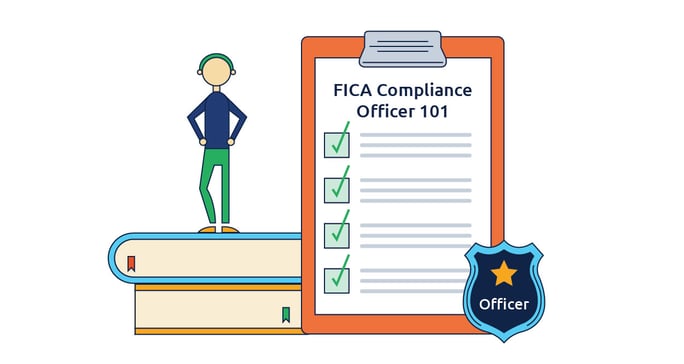In terms of the Financial Intelligence Centre Act (“FICA”), one of the key requirements includes and forms the backbone of the legislation, is for Accountable Institutions (“AIs”) to appoint a Compliance Officer.

The wording of s42A provides that AIs are required to appoint a person with sufficient competence and seniority within that AI to ensure that both the AI itself and its employees comply with the provisions of FICA as well as with the practical application and implementation of FICA within the institutions’ Risk Management and Compliance Programme (“RMCP”). An RMCP is a comprehensive, living document that must identify, assess, monitor, mitigate and manage the risks that your clients, products and services may involve or facilitate money laundering, terrorist and proliferation financing.
There is no requirement in terms of FICA that a Compliance Officer must have a compliance or legal related qualification or degree. However, from a practical perspective, the FIC has been asking in inspections recently for the Compliance Officer to provide evidence of their qualifications so it is worthwhile making a considered decision when appointing a Compliance Officer.
Registration as an AI is the first step in terms of satisfying FICA compliance requirements. This is done by completing an online form on the Financial Intelligence Centre (“FIC”) registration and reporting platform, GoAML. The first person to register on behalf of an AI must be the Compliance Officer, who will be required to complete the online form. There is no cost for the registration and you will receive an email notification of successful registration from the FIC to keep on your records, along with an Organisational ID number.
The Compliance Officer, usually appointed via a Board resolution/appointment letter, will also be required to provide his/her details as the Registering Person. Should you be a larger organisation, you are able to also appoint Money Laundering Reporting Officers (“MLRO’s”) to assist with the Compliance Officer’s reporting obligations on GoAML, and these MLRO’s are also required to be registered.
Businesses are required to have a compliance function inhouse, so the Compliance Officer should be an internal person with sufficient experience, seniority and authority to manage oversight with your business’s FICA compliance processes.
Requirements and Obligations of a Compliance Officer:
- To assist the Board of Directors or senior management of an AI with its compliance obligations under FICA and in terms of its RMCP
- To have a comprehensive and adequate knowledge of FICA and its RMCP to not only ensure compliance but when an AI is inspected, to be able to liaise with the FIC directly to describe and respond to the FIC as to how the AI is pragmatically adhering to FICA in its everyday operations
- To acquire the above knowledge, the Compliance Officer should undertake adequate and regular FICA training (DocFox provides various training courses to assist, view our available FICA trainings)
- Responsible for the AI reporting suspicious transactions, activities, cash threshold and terrorist property reports to the FIC efficiently and within the allotted time periods
- To ensure that the AI upholds its record keeping obligations of not only its Customer Due Diligence documents but also details of any client transactions that take place
- Remain up to date and current with any FICA changes. DocFox publishes several articles and sends communication to clients whenever legislation changes.
DocFox is able to assist the Compliance Officer in satisfying FICA obligations. For example, as part of our Compliance Services packages, we have drafted an example template RMCP and Risk Rating matrix that can be used for various types of AIs. We also offer FPI approved FICA training, provide a platform for record keeping and various other services.
Please feel free to reach out to our compliance team to see how we can assist your business: compliance@docfox.co.za